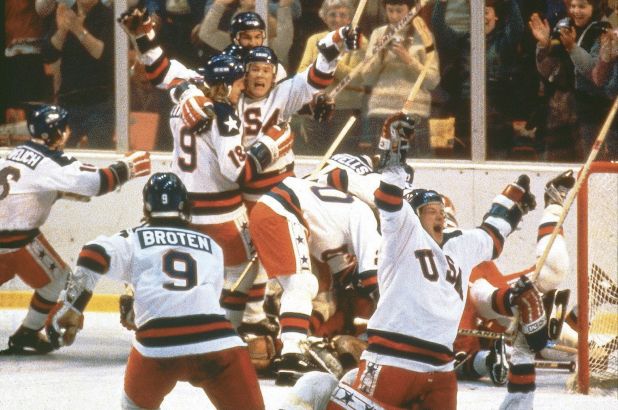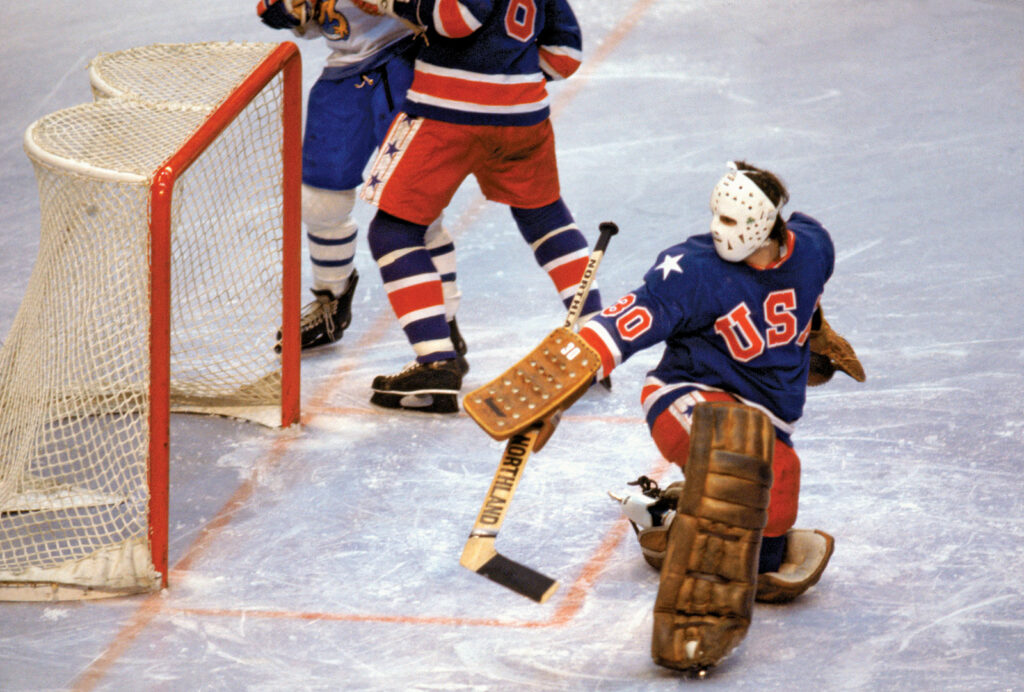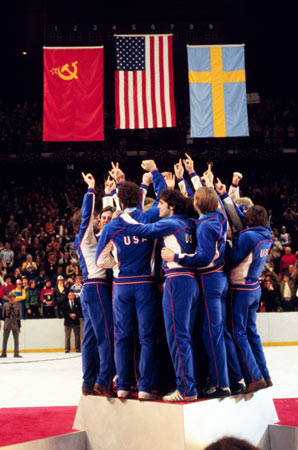40 Years Ago: Remembering the Miracle on Ice
For anyone who remembers the U.S. Hockey team’s shocking victory over the seemingly unbeatable Russians on February 22, 1980, the fact that it has now been forty years since that amazing night likely does little to dim your memory of what has become known in sports lexicon as “The Miracle on Ice.”

I was a 12-year-old growing up in Southern Virginia, a place no one would ever confuse for being a hockey mecca. However, we were big fans of the Winter Olympics, most especially because they were being held in the United States in Lake Placid, New York.
Unlike today where we have hundreds of television stations, not to mention the internet, and you can watch coverage seemingly all day and all night, in 1980 most of the coverage occurred during the evening hours and often events were shown on tape delay. However, because we didn’t have a news network on our phone, it was easy to not know the results when watching the show each night.
By the time the U.S. was going to play Russia in the hockey semifinals, the two week run of the Olympics was nearing conclusion.
American Eric Heiden had already won four speed skating gold medals in record time and the next day would claim his fifth in the men’s 10,000 meters.
The popular event of figure skating had produced heartbreak and disappointment for the Americans. Linda Fratianne had just missed out on a gold medal in the women’s figure skating and Charles Tickner claimed bronze in the men’s figure skating, but the biggest heartbreak came in the pair skating. The five-time U.S. Champion duo of Tai Babilonia and Randy Gardner were forced to withdraw from the competition because Gardner had a serious thigh injury.
Though he finished with the silver medal, American downhill skier Phil Mahre had produced the most exciting moment by an American not named Eric Heiden with his second place showing in the men’s slalom.
Prior to the start of the Olympics, few expected the American men’s hockey team to reach the medal rounds, much less go 4-0-1 with a shocking 7-3 dominating win over Czechoslovakia and a 2-2 draw with Finland.
Even with their strong play in the early rounds, the U.S. was given little chance against the dominant Russians, winners of four straight gold medals. The two met in an exhibition at Madison Square Garden on February 9th and the Soviets had easily won the game 10-3.
Few expected anything different in the rematch on February 22nd. In fact, many felt that if the U.S. could keep from getting embarrassed by the Russians and then win the bronze medal game it would be a very successful tournament.
The game was scheduled to start at 5:00 p.m. Eastern Time, but ABC Television requested it be delayed to 8:00 p.m. so it could be shown live in prime time. The International Ice Hockey Federation, which for some reason had the final decision rather than the International Olympic Committee, chose to deny the request after the Russians complained that pushing the game back would mean it would start at 4:00 a.m. in Moscow, as opposed to 1:00 a.m.
ABC decided not to show the game live and instead showed it on a delayed basis at 8:00 p.m. At the beginning of the broadcast, ABC’s Olympic host Jim McKay stated that the game had already been played (though he did not reveal the outcome), but in this era before the internet and 24-hour news cycles, most Americans watching the game did not know the result.
Indeed, at my house, I remember being glad that it was a Friday night, so I would not have to go to school the next day and could stay up to watch. However, I also remember thinking if the U.S. was getting beat too badly I hoped they would switch to whatever other events had happened that day.
As it turned out, the game was more exciting than could have ever been expected.
It did not take long for the Russians to strike, as they scored just over nine minutes into the opening period. However, the Americans quickly answered with a goal by Buzz Schneider. The Russians responded with a second goal and probably should have scored a couple more in the period, but American goalie Jim Craig turned away several shots in the final minutes.

It looked like the Russians would end the period with a lead, but after Soviet goalie Vladislav Tretiak made a save on a shot by Dave Christian, he misplayed the rebound and Mark Johnson sliced through to take the puck and then score the tying goal with one second remaining.
Many believe that it was the decision made by Russian coach Viktor Tikhonov following the period that helped turn the tide towards the Americans. In fact, Tikhonov himself later said it was the “biggest mistake of my career.”
Upset with the mistake made by his goalie, he decided to bench Tretiak, who was widely considered the best goalie in the world, in favor of his backup Vladimir Myshkin.
Early on, the decision seemed to have little impact on the game as the Russians controlled the play throughout the second period. They out-shot the Americans 12-2, but were only able to convert that advantage into one power play goal as Craig and the American defense held strong.
Though they trailed 3-2 entering the final period, the Americans had clearly shown that they were in the game and were playing with great confidence.
After a Russian penalty nearly seven minutes into the period, the Americans went on the offensive. After a couple misses, Mark Johnson managed to put a shot under the glove of Myshkin to tie the game.
Just a few moments later, U.S. captain Mike Eruzione took a pass from Mark Pavelich and fired a shot past Myshkin, who was partially shielded by his own man, to give the Americans a surprising 4-3 lead with 10 minutes remaining.
For all Americans watching, whether they knew the outcome or not, the last ten minutes seemed to last forever. Trailing for the first time in the game to a team they had expected to easily defeat, the Russians attacked ferociously. They nearly scored when a shot hit the post, but it ricocheted away.
Instead of going into a defensive posture, the Americans kept on the offensive. American coach Herb Brooks could be heard saying, “Play your game. Play your game.”
As the clock continued to tick down, the Russians started to panic, taking wild shots and moving away from the disciplined style that had made them great. The Americans expected that they would pull the goalie in the final moments to try and create an advantage, but it never happened.
In the final moments the Americans were able to clear the puck and as the final seconds ticked away the partisan crowd counted down to victory.
ABC announcer Al Michaels took up the count in the final seconds and then uttered one of the most famous lines in sports broadcast history, “11 seconds, you’ve got 10 seconds, the countdown going on right now! Morrow, up to Silk. Five seconds left in the game. Do you believe in miracles? YES!”
One interesting thing about the emotional victory that many people may not remember is that it did not secure the gold medal for the Americans. In 1980, the medal round was a round-robin, not a single elimination format as it is now. Under Olympic rules at the time, the group round game against Sweden was counted along with the medal round games against the Soviet Union and Finland, so even after defeating the Soviets it was mathematically possible for the United States to finish anywhere from first to fourth, depending on the final game.
Fortunately, the Americans were not emotionally exhausted after their shocking victory. Though they trailed 2-1 into the third period, they scored three goals in the final stanza to secure the victory and the gold medal.
As it turns out, the Americans have not returned to the gold medal stand since the win in 1980. The Russians went on to win the gold medal in the next three Olympics (the third in 1992 as the Unified Team after the fall of the Soviet Union). In 1986 the IOC started allowing professional athletes to compete in the Olympics and in 1998 the NHL allowed their players to compete for the first time. The NHL players competed in every Olympics from 1998-2014, but did not compete in 2018.
The Americans finished second to Canada in both the 2002 and 2010 Olympics. They reached the bronze medal game in 2014 (finishing fourth) and placed seventh in 2018.

Shortly after the Olympics, U.S. President Jimmy Carter announced that the Americans would not participate in the 1980 Summer Olympics in Russian in protest of the recent invasion of Afghanistan. Russian then retaliated by not participating in the 1984 Summer Olympics in Los Angeles.
Interestingly, there had been some concern that the Russians might not compete in the 1980 Winter Olympics because of America’s strong rhetoric and protests over their move into Afghanistan. Had that happened, this epic “David vs. Goliath” moment would never have occurred and sports history would have forever been very different.
In retrospect, the 1980 “Miracle on Ice” turned out to capture the spirit of America at a time when it was very much needed in a way that is now very difficult for the Olympics to do in an era in which almost all the athletes are professionals.
Occurring at a time when American spirit was at an all-time low due to a series of economic challenges as well as the occupying of the U.S. Embassy in Iran and the taking of 53 American hostages, the “Miracle on Ice” was an uplifting moment that still brings joy to those who remember.
From the now common chant of “U-S-A, U-S-A” to the 2004 movie “Miracle” that moment is forever captured in the hearts and minds of Americans and even now 40 years later serves as a reminder of national pride and unification, something we could badly use today.
Here is a link to another article about the Miracle on Ice written by Chris Peters for ESPN.